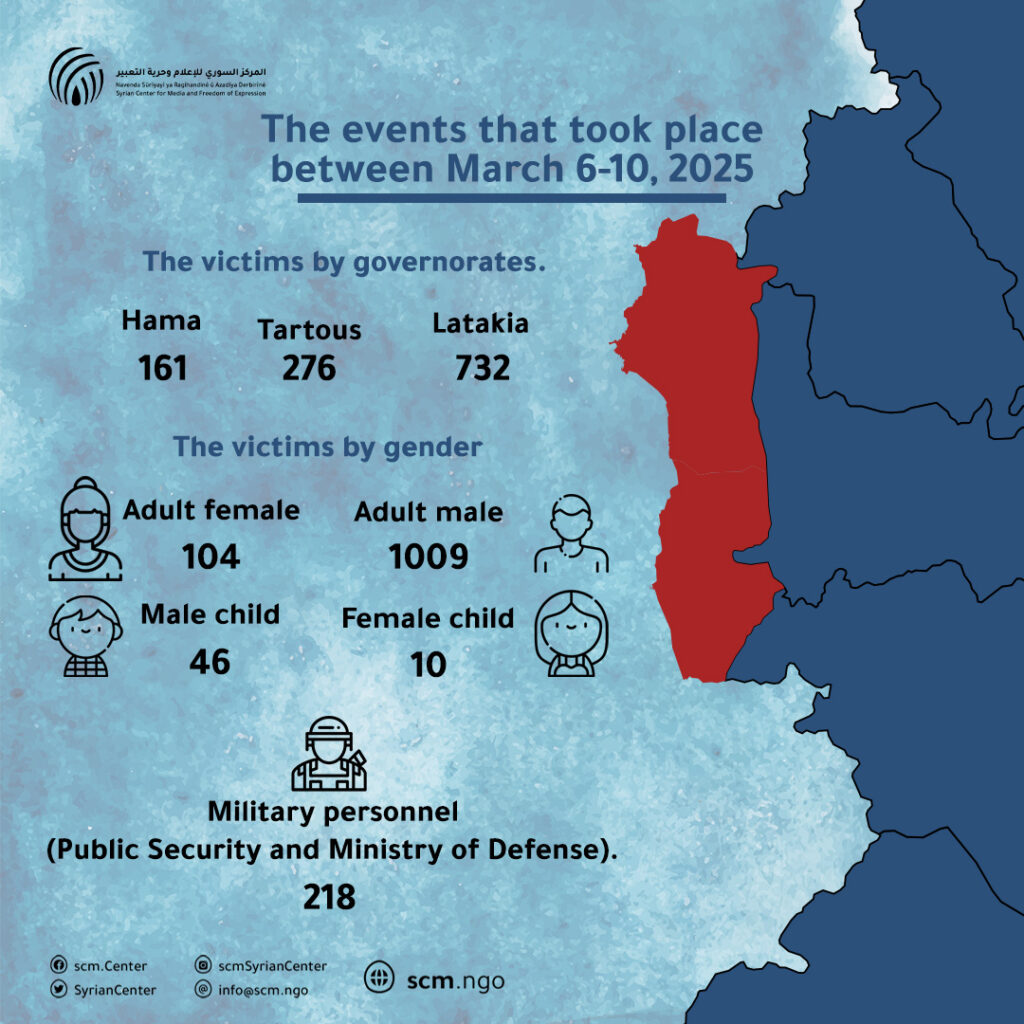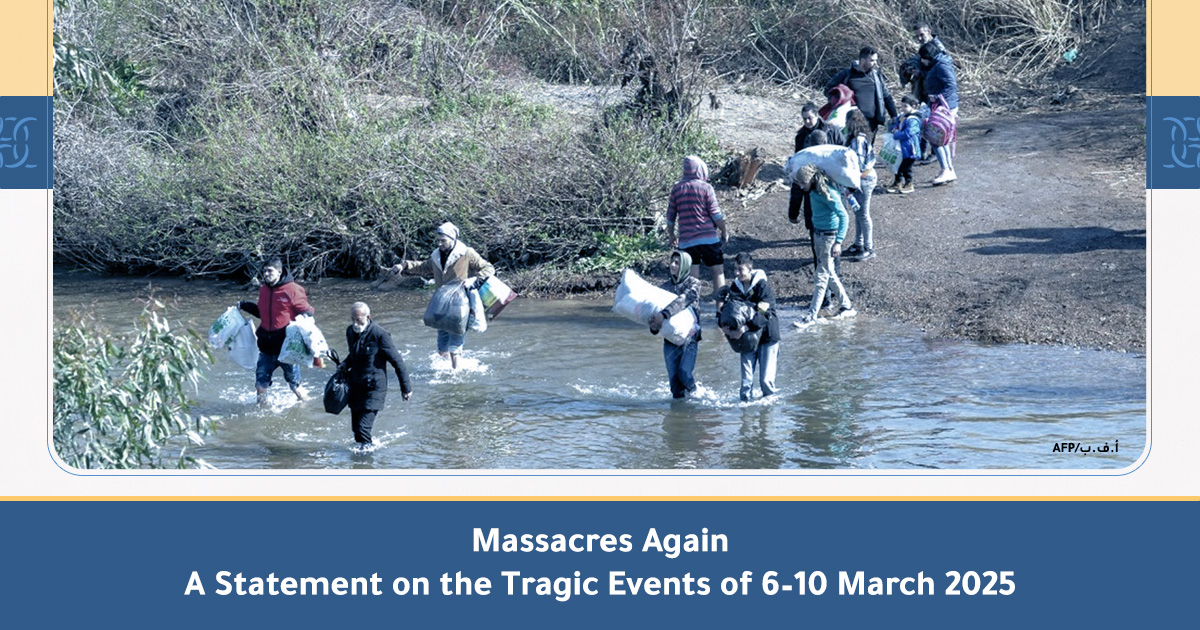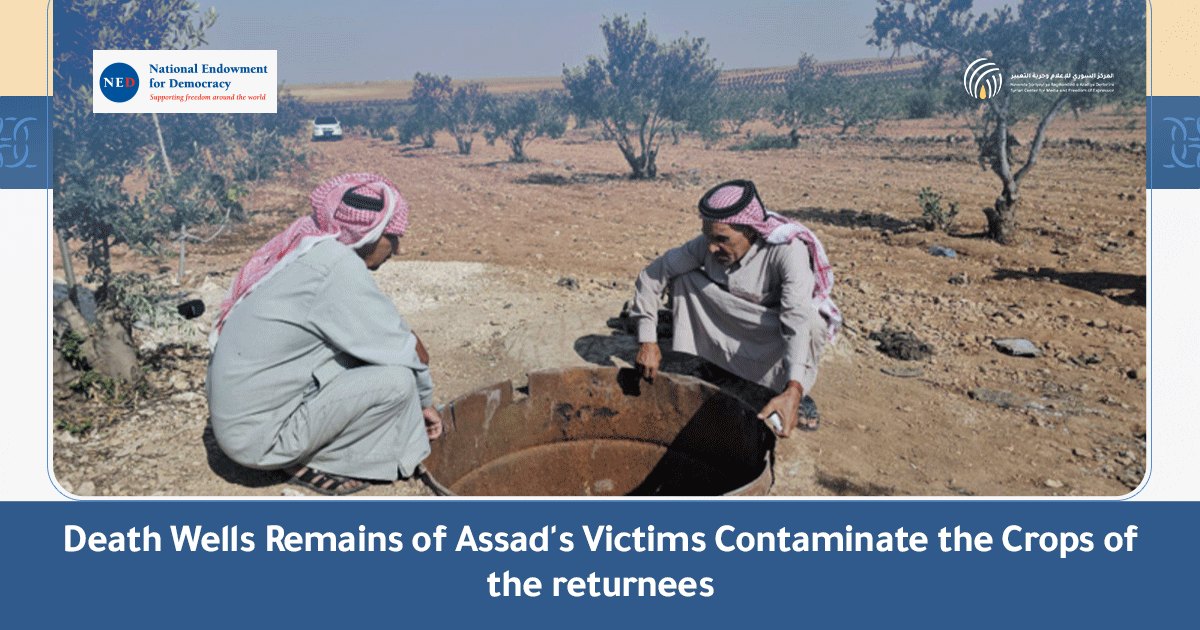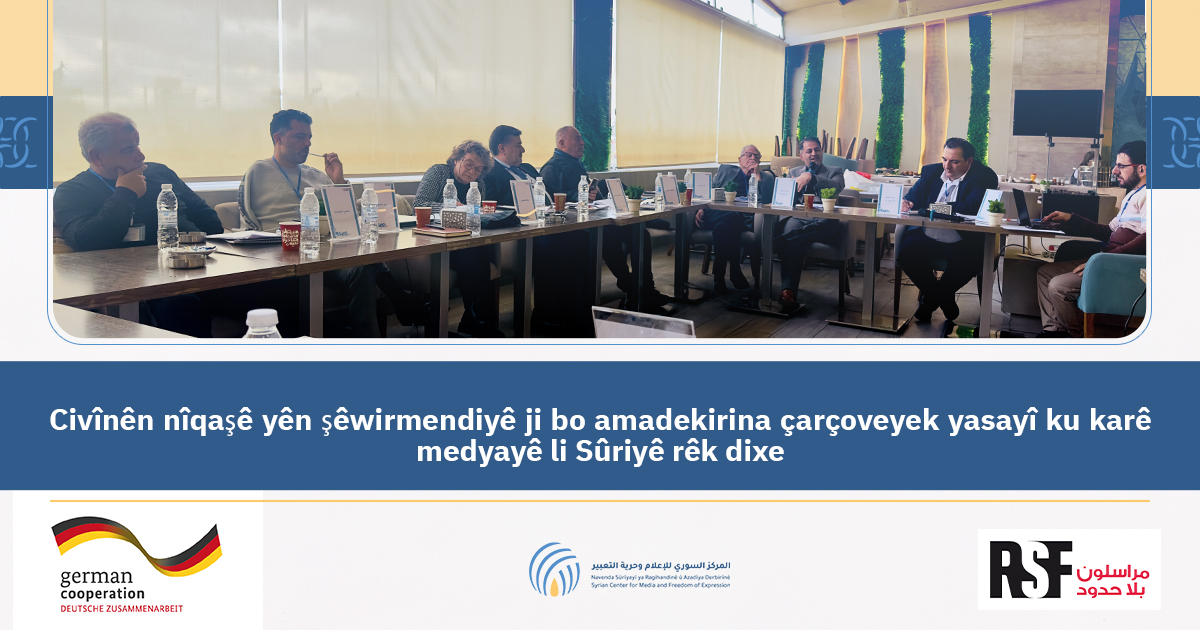Massacres Again
A Statement on the Tragic Events of 6–10 March 2025
The figures were updated on 11 July 2025. As documentation and verification continued, some names were found to be duplicated, and a few individuals initially listed as deceased were later confirmed to be alive.
The Syrian Center for Media and Freedom of Expression (SCM) expresses its deep solidarity with the families of civilian victims and the families of General Security personnel who lost their lives in the wave of violence and violations that erupted in the Syrian coastal region on 6 March 2025.
As of the date of this statement, SCM’s Violations Documentation Project has recorded 1,060 civilian deaths related to the recent events—671 in Latakia, 245 in Tartous, and 144 in Hama. Among the victims are 71 women and 61 children (49 Male and 12 Female). The project has also documented the deaths of 218 General Security personnel. All victims—civilian and security—have been identified by name. Documentation and verification efforts remain ongoing, and casualty figures are expected to rise in the coming days. Although it is currently difficult to determine the identities of those directly responsible—given the complexity of the situation and the multiplicity of actors involved—preliminary findings point to the possible involvement of individuals affiliated with the government in acts of killing and violence.
SCM stresses that these recent tragic events cannot be seen as isolated incidents. Instead, they are a clear indication of Syria’s enduring fragility, shaped by decades of repression and systematic violations. Breaking the cycle of violence and preventing future atrocities will require a comprehensive justice framework; one that addresses the root causes of the conflict, upholds the rule of law, and lays the foundation for civil peace.
At the same time, these events have also revealed a shared human fabric among Syrians. SCM has documented testimonies from survivors who recounted how neighbors, despite sectarian differences, protected and helped them escape, which provides a glimmer of hope and a foundation upon which to confront incitement and violence.
SCM also expresses grave concern over the spread of misinformation and hate speech, particularly through religious platforms. Such discourse plays a dangerous role in fueling tensions and deepening social divisions; a dynamic worsened by the absence of transparent, reliable official state media and the lack of clear legal and media policies to counter and criminalize hate speech.
SCM welcomes the government’s establishment of an investigation committee tasked with examining the events, uncovering the circumstances that led to the violence, investigating violations, and identifying those responsible. SCM affirms its full commitment and willingness to cooperate with the committee and to support its work with all available resources. However, the SCM stresses that for these efforts to succeed, the investigation must be prompt, transparent, independent, and impartial in order to ensure genuine accountability, prevent impunity, and provide fair redress for victims and their families.
While SCM condemns the acts of violence, unlawful killings of civilians, and attacks on property, and denounces the assault on members of General Security forces—carried out by armed groups believed to be affiliated with the ousted Assad regime—it reaffirms that the primary responsibility for protecting civilians lies with the Syrian government. The government has a legal obligation to protect all citizens without discrimination, as affirmed in the Constitutional Declaration of 13 March 2025 (Articles 12, 18, and 19), and in accordance with international legal obligations that require proactive measures to prevent violence, ensure non-discriminatory protection, combat hate speech, and promote stability.
SCM stresses that lasting stability and the prevention of future atrocities require a genuine commitment to justice and accountability, and the adoption of concrete, rights-based measures to ensure the protection of all Syrians, regardless of affiliation or background. To that end, SCM urges the Syrian government to take the following steps immediately:
- Ensure the protection of all civilians, without discrimination, from all forms of violence, violations, retaliation, and incitement. Implement proactive safeguards to prevent the recurrence of such crimes.
- Enforce standardized uniforms for General Security personnel, requiring compliance with official dress codes, insignias, and ranks. Ban face coverings during service to facilitate accountability and prevent impersonation of official forces.
- Respect the sanctity of private homes. Searches must be judicially authorized and conducted strictly in accordance with legal procedures. Violations must be prosecuted under the Syrian Penal Code.
- Adhere to the Local Administration Law No. 15 of 1971 and its amendments, which require that home searches be conducted in the presence of a local mayor (mukhtar) or a member of the neighborhood committee alongside General Security personnel.
- Comply with Article 9 of the Constitutional Declaration, which prohibits any individual, entity, or group from forming military or paramilitary units. All weapons must remain strictly under state control.
- Officially recognize all victims without discrimination. Guarantee their right, and that of their families, to truth, justice, and full and effective reparations and facilitate their access to effective accountability and remedy mechanisms.
- Provide adequate resources to ensure that the government-formed investigation committee can conduct thorough investigations in line with international standards. Its work must remain independent, impartial, and free from political or military interference.
- Secure all crime scenes and protect them from tampering or evidence destruction. Ensure protection for witnesses willing to testify, safeguarding their security and encouraging participation in uncovering the truth.
- Ensure that all governmental and security institutions fully cooperate with the investigation committee, granting unrestricted access to evidence, witnesses, and affected sites.
- Publish the investigation results transparently nationally and internationally and ensure that the process leads to fair and effective judicial proceedings against all perpetrators.
- Cooperate fully with the UN Independent International Commission of Inquiry on Syria, allowing unrestricted access to investigate the recent events and ensure that all relevant government bodies participate in establishing the facts and ensuring accountability.
- Prohibit the use of religious platforms to incite violence or hatred and ensure the regulation of inflammatory speech in ways compatible with constitutional protections for freedom of expression and belief.
- Establish official, public information channels that communicate with the Syrian population clearly and transparently. This is essential to counter disinformation, misinformation, and hate speech. Legal and practical measures must also be taken to criminalize hate speech in line with Syria’s international obligations.
- Finally, the Center reiterates the urgency of launching a comprehensive, Syrian-led, and Syrian-owned transitional justice process grounded in the needs and aspirations of all Syrians. This process should include:
- Developing a clear roadmap for transitional justice, ensuring the effective participation of victims, survivors, women, and affected communities, including refugees and internally displaced persons.
- Initiating legal and institutional reforms to eliminate all forms of discrimination and enshrine full equality among Syrians.
- Ensure that justice is not selective, addresses violations committed by all parties, and guarantees effective redress for victims, truth-telling, and the non-repetition of crimes and abuses.
- Supporting and promoting the meaningful participation of victims and survivors in all justice processes and advancing the leadership of women and victim-led groups in accountability and truth-seeking efforts.






